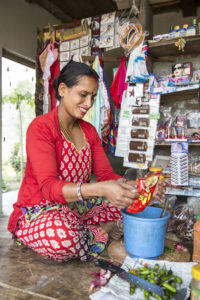
Sunita Neupanne received entrepreneurship training and Rs. 5000 support to start her grocery store in Dhading, Makwanpur. She added some fancy accessories in her shop as well as some snacks.
Family poverty and insecure livelihoods are a significant issue in Nepal and an underlying cause of problems such as child labor, human trafficking, non-enrollment in schools, and poor learning outcomes.
To provide families a route out of poverty, World Education implements livelihood programs to diversify families’ options through skill training, encourage self-employment through specialized training, financial literacy and strengthening of microfinance institutions—especially women’s savings and credit groups—to support local business development and increase access to banking services. Besides providing loans, these savings groups serve as important civil society organizations that help members cope with trauma, share information about access to government support services, and advocate on behalf of the poorest and most marginalized families who are often unable to access resources or support services on their own.
As agriculture is the backbone of the rural economy, World Education helps farmers increase productivity and rural incomes through a discovery learning approach in Farmer Field Schools.
Over a crop cycle, farmers get hands-on experience comparing traditional farming methods and crops with improved methods and alternative varieties. These new skills combined with access to microfinance and the development of marketing linkages has helped thousands of marginalized families each year to increase food production and incomes. Farmers are also supported to improve and expand efforts to rear livestock to a commercial level. These skills help adults living in poverty develop stronger and more stable livelihoods.
Read an editorial by Country Director Helen Sherpa in NewsDeeply’s Women and Girls Hub on how microfinance is helping women recover from the 2015 earthquake.
